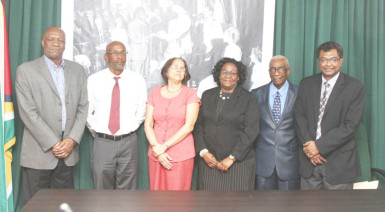The members of the Commission of Inquiry (CoI) that will probe last Thursday’s fiery revolt at the Georgetown Prison, which claimed 17 lives, were sworn in yesterday and have been given additional time to complete their final report.
Initially, the CoI was to begin its work yesterday.
Public Security Minister Khemraj Ramjattan had last Friday disclosed that Justice James Patterson (Chairman), human rights activist Merle Mendonca and former prisons director Dale Erskine will make up the commission. They took their oaths before Chief Magistrate Ann McLennan in a simple ceremony at the Ministry of Presidency during the mid afternoon hours.

The inquiry will be held at the Ministry of Presidency, Department of Citizenship on Waterloo Street.
Hours after the 17 prisoners were killed and another five injured when fire was set in their cell in protest over a range of issues, President David Granger called an emergency meeting of the National Security Committee during which he instructed Ramjattan to set up the three-member CoI.
According to the Terms of Reference (ToR), which was released yesterday, the commission has been constituted to inquire into all the circumstances surrounding the deaths of 17 prisoners from the Camp Street Prison, Georgetown on the morning of Thursday, March 3, 2016, to report the findings and conclusions to the Minister of Public Security and to make recommendations on any action that should be taken to avoid a recurrence.
The inquiry will investigate, examine and report on the causes, circumstances and conditions that led to the fatal disturbances and any other subsequent disturbances. It will also inquire into the nature of all injuries sustained by the prisoners.
It will further “Deter-mine whether the conduct of the staff of the Guyana Prison Service who were on duty” on that day and thereafter was in conformity with the Standard Operating Procedures of the Guyana Prison Service and “whether the deaths of the 17 prisoners was as a result of the negligence, abandonment of duty, disregard of instructions, inaction of the prison officers” who were on duty the previous night and on that day.
The document stated that the commission is to make comprehensive recommendations to ensure the safety of the prisons.
The commission must examine and make findings and recommendations to “improve the physical infrastructure of the prison; the existing security arrangements in respect of the custody, management and control of prisoners; the appropriate treatment of prisoners in compliance with legal and other requirements and to prevent a recurrence of any such disturbances.”
In brief comments after the oaths were taken, Minister of State Joseph Harmon said the incident “affected all of us irrespective of where we are and what is our station in life.” He said it was in this regard that the President instructed CoI be established to enquire into the circumstances which led to those disturbances and for it to make recommendations to prevent something like that happening again.
“This Commission of Inquiry, we believe, should be done in a very speedy fashion. While we are not trying to put any pressure on the commissioners,” he said, the society at large was looking for answers quickly.
He said there had been media reports that the CoI should not be held until the police investigation was completed. “We know that that is not the situation and I think that we are all aware that this Commission of Inquiry is separate from any police investigation which will take place,” he said.
Harmon stated that Ramjattan is very concerned about what had transpired and has even lost sleep over the matter.
The commissioners later met the two ministers to discuss a number of issues including some related to administrative matters.
Harmon told Stabroek News that it is expected that the commissioners will have their first meeting today where they will agree on the procedures and the ToRs. They will subsequently decide at what point in time they will take witnesses. He pointed out that the commissioners have a wealth of experience and government believes “they know what they are about.”
Asked about the March 15 deadline, Harmon explained that this had been revised in view of the late start and the volume of work the commissioners have to do. Noting that the date has been put back by about two weeks he said, “We recognized that that time would not be enough for them to actually do a proper investigation…. We expect that they should finish the work within a month.”
According to Harmon, it is important for the citizenry to know that the commission would not be “hoodwinked”.
“The commission has been given wide scope and the instrument they received, gives them as much power as a High Court judge to summon witnesses and take evidence as you would in the High Court and I want to give the assurance to the relatives of the deceased that they can come forward, they can give evidence to the commission and the commission would have the full authority to take their evidence and to make recommendations to the administration,” he said.
Asked about evidence being taken from prisoners, Harmon said that the commissioners will regulate their own process in this regard choosing where they will speak to the prisoners and how many. He said that it is expected that they will be taking evidence from not only prisoners in Georgetown but other prisons. “They are going to be looking at how you can avoid this occurring again so they will take evidence from inmates, from the relatives of the deceased, the prison officers and any other persons,” who in the opinion of the commission can give evidence that will help in the determination of situation given the terms of reference.
He said the commission will also review the findings of other inquiries and look at the recommendations to see whether they were implemented.




